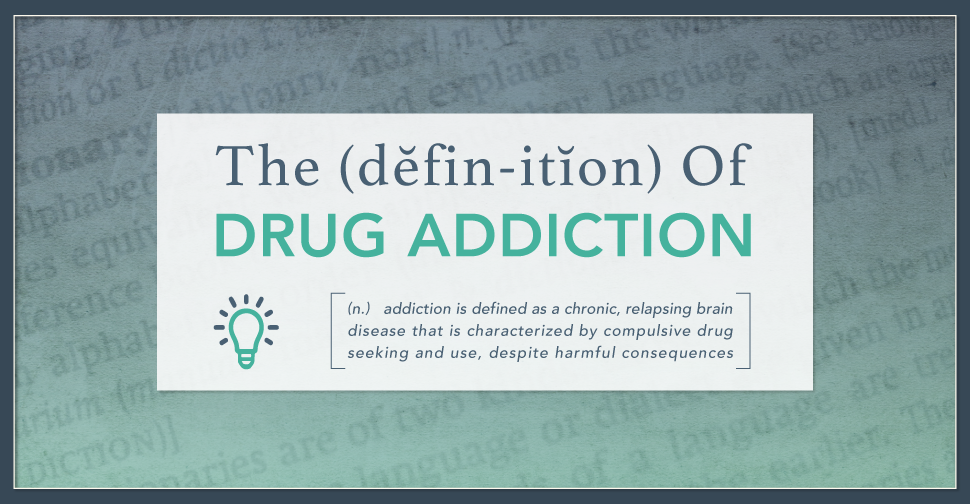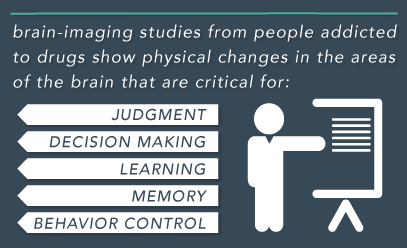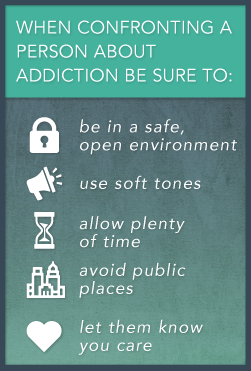
For some, perhaps defining drug addiction seems redundant; an addiction is an addiction, right? Most of us may associate addiction with the inability to stop doing or using something. But drug addiction is different. Decades of research has shown that drug addiction is deeper than a compulsion. Instead, it is a disease of the mind.

While drug abuse may begin as recreational and may seem harmless to the person using the drugs, the danger lies in the forming of a habit. Habits lead to prolonged abuse, which becomes addiction. But what keeps a person addicted to a drug? Indeed, what makes a person continue to abuse drugs, even if he or she recognizes the addiction, and wants to stop? For the answers to these questions, read on for the definition of drug addiction, symptoms of drug addiction and how to recognize them, and how to find treatment, the most effective way to help an addicted individual.
What Is Drug Addiction?
The National Institute on Drug Abuse (NIDA) provides a comprehensive definition of drug addiction, stating, “addiction is defined as a chronic, relapsing brain disease that is characterized by compulsive drug seeking and use, despite harmful consequences.” Addiction is recognized as a brain disease because drugs literally cause changes to the brain. This may be a difficult concept to grasp, but it’s true. How does it work?

Drugs which are addictive work in the brain by producing pleasure (known in science as reward). They trigger the brain’s reward system, and interrupt the normal messaging flow. Dopamine, a neurotransmitter in the brain, can be found in the areas of the brain which are responsible for emotion, feelings of pleasure, cognition, motivation, and movement. When people take drugs, this reward system becomes overstimulated, usually from an excess buildup of dopamine. This produces the rush feeling people tend to crave when abusing substances. Over time, and with prolonged abuse of drugs, a person’s brain rewires itself to seek this new way of producing reward. Essentially, the brain makes a person crave that rush feeling again and again.
So, drug addiction is not voluntary. While it is easy to see that many people choose to use drugs for the first time, continued abuse may not be something they can help. The NIDA explains this may be due to “brain-imaging studies from people addicted to drugs show physical changes in the areas of the brain that are critical for judgment, decisionmaking, learning, memory, and behavior control. Scientists believe that these changes alter the way the brain works and may help explain the compulsive and destructive behaviors of an addicted person.”
Symptoms Of Drug Addiction
People who have developed an addiction to drugs or alcohol tend to be affected by tolerance to the substance. Tolerance occurs when a person is no longer affected by the same amount of a drug and needs to take more of it to feel the same effects. Tolerance is one of the major signs of addiction, as is physical dependence. Other signs include:
 When a person feels that he or she needs to use the drug on a regular basis, whether daily or several times throughout the day
When a person feels that he or she needs to use the drug on a regular basis, whether daily or several times throughout the day- Experiencing strong urges to use a drug
- Maintaining a steady supply of the drug
- Falling short in school or work responsibilities due to substance abuse
- Engaging in risky behavior to obtain the drug (i.e. stealing or doing other things a person would not normally do)
- Wanting to stop using the drug, but being unable to successfully quit
- Undergoing withdrawal when a person tries to quit
When trying to recognize drug addiction symptoms in those around you, behavioral changes may be the biggest clue. For example, people who are newly affected by drug addiction may begin falling behind in school or work performance, or may no longer have interest in activities they used to love. They may also no longer pay much attention to their appearance, or may neglect their health. People with developing addictions may also become secretive in an effort to hide their addictions, especially if they are not ready to face their disorder yet.
People who may have developed addiction will benefit most from comprehensive treatment. Getting loved ones the help they need may be difficult, though. Often, addicted individuals are not ready to admit they have a substance use disorder, and this can present a problem for speaking to them about it. When confronting a person about addiction, be sure to do it in a safe, open environment, and to use soft tones. Allow plenty of time, and try to avoid public places so the person does not feel attacked or humiliated. Above all, let the person know you care, and stress the importance of treatment in their recovery from addiction.
How To Find Treatment For Drug Addiction
Addiction can be daunting. Not everyone wants to admit they have developed a brain disorder. Even once a person does recognize his or her addiction, the prospect of treatment may seem overwhelming—but it doesn’t have to be. When you contact us at DrugRehab.org, we will give you the information you need to make informed treatment decisions, tell you about our treatment facilities, and help you begin your recovery path.
Sources
Mayo Clinic—Drug Addiction: Definition
National Institute On Drug Abuse—The Science Of Drug Abuse And Addiction: The Basics
Substance Abuse And Mental Health Services Administration—Substance Use Disorders


